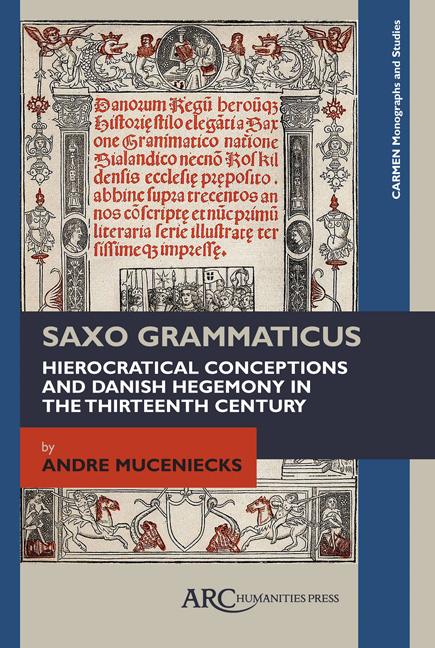Book contents
- Frontmatter
- Contents
- List of Illustrations
- Acknowledgements
- Foreword
- Preface
- Chapter 1 Denmark and the Baltic in the Thirteenth Century
- Chapter 2 The Work
- Chapter 3 Political Conceptions
- Chapter 4 Euhemerism and the East in Saxo Grammaticus
- Chapter 5 Virtues and Values in Saxo Grammaticus: The Four Cardinal Virtues
- Chapter 6 The Thematic of the Counsellor
- Conclusion
- Appendix 1 List of the Kings in Books I–VIII of the Gesta Danorum
- Appendix 2 Rulers and Archbishops of Denmark in Relation to Events in the Baltic, the Empire, and the Papacy
- Appendix 3 Genealogy of the Valdemarian Kings
- Bibliography
- Index of Persons
- Index of Places and Peoples
- Index of Authors and Primary Sources
- Index of Subjects
Preface
Published online by Cambridge University Press: 15 January 2021
- Frontmatter
- Contents
- List of Illustrations
- Acknowledgements
- Foreword
- Preface
- Chapter 1 Denmark and the Baltic in the Thirteenth Century
- Chapter 2 The Work
- Chapter 3 Political Conceptions
- Chapter 4 Euhemerism and the East in Saxo Grammaticus
- Chapter 5 Virtues and Values in Saxo Grammaticus: The Four Cardinal Virtues
- Chapter 6 The Thematic of the Counsellor
- Conclusion
- Appendix 1 List of the Kings in Books I–VIII of the Gesta Danorum
- Appendix 2 Rulers and Archbishops of Denmark in Relation to Events in the Baltic, the Empire, and the Papacy
- Appendix 3 Genealogy of the Valdemarian Kings
- Bibliography
- Index of Persons
- Index of Places and Peoples
- Index of Authors and Primary Sources
- Index of Subjects
Summary
A LOT HAS been written about the Gesta Danorum, both in Scandinavia and abroad. This lengthy and most important Danish medieval source provided a great deal of inspiration—and criticism alike—to the following authors and scholars. Some preliminary words are, therefore, necessary to justify the production of one more work about it.
This book is based in great part on our Master's dissertation, argued in Curitiba, Brazil, in the beginning of 2008. It began as a restricted study of excerpts in Saxo Grammaticus with connection to the East—most specifically the Eastern Baltic—but assumed greater proportions with time. At the time, studies concerning Scandinavia and Germanic populations in the Middle Ages were a novelty in Brazil and Latin America, a circumstance that, although improved, still remains a setback. Medieval scholarship in Brazil, firmly grounded in its French founders and owing a great deal to the Annales School, was still disconnected from Scandinavian and Germanic studies.
Besides this novelty, personal motivations were of equal importance when choosing our subject and Saxo seemed to be a suitable choice, not to mention that just after the decades of 1990s and 2000s the Baltic area started to be studied more seriously in connection with the Gesta Danorum.
Since then there has been in Brazil and in Latin America generally a visible evolution in quantity and quality in the production of monographs and studies about Northern Europe, and also the creation of important groups for research, such as the LEM (Leituras em Escandinávia Medieval—“Readings in Medieval Scandinavia”) and the NEVE (Núcleo de Estudos Vikings e Escandinavos—“Centre for Scandinavian and Viking Studies”); also the last decades witnessed an exponential growth in international production by scholars from Brazil and Latin America as well as a increased engagement in international events.
Still there is, of course, space and need for more production and dialogue with international scholars and centres, and isolation remains a concern not only regarding international production, but also among peers, most of all the established scholars. There are still very few chairs and tenures occupied by specialists in Scandinavia, accompanied by a great interest in the thematic from undergraduates.
- Type
- Chapter
- Information
- Saxo GrammaticusHierocratical Conceptions and Danish Hegemony in the Thirteenth Century, pp. xii - xixPublisher: Amsterdam University PressPrint publication year: 2017



